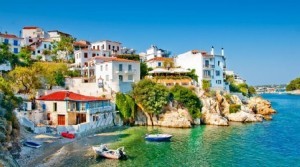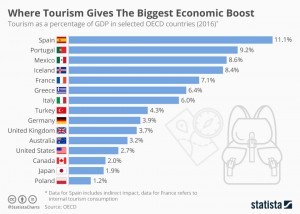With the weather improving, summer is finally on the horizon. That means hotels, restaurants and attractions in tourist hotspots across the world are preparing themselves for a lucrative holiday season. In the midst of an unprecedented economic crisis, Greece had one industry that contributed to the country remaining afloat. According to a report released by the OECD, tourism made up 6% of Greece’s GDP based on data from 2016. Tourism certainly makes a difference through job creation at community level but it also provides a significant contribution to some major economies. Some countries tend to feel the impact of tourism more than others and according to a recent OECD report, Spain in particular gets a healthy boost from holidaymakers every year. In 2017, 82 million tourists were lured to Spain by its warm climate, excellent beaches, vibrant culture and efficient transportation network. That makes it the second most visited country worldwide and according to the Spanish government, they spent an impressive €87 million.
It comes as little surprise that tourism is major aspect of the Spanish economy, judging by those figures. Entitled “OECD Tourism Trends and Policies 2018”, the research found that tourism accounted for 11 percent of Spain’s GDP in 2016. Tourism is also important in neighboring Portugal where it accounted to 9.2 percent of GDP that same year. In countries like Germany and Japan where the economy is more geared towards the industry and service sector, tourism’s impact is not felt as strongly. It accounted for 3.9 percent of Germany’s GDP in 2016 while in Japan it was 1.9 percent. In the United States, it contributed to 2.7 percent of GDP in 2016.
source: statista
Ask me anything
Explore related questions






